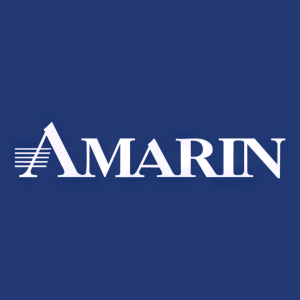Amarin Issues Statement Supporting FDA’s Action to Revise Labeling for Fenofibrate Drugs Reinforcing a Lack of Cardiovascular Benefit
Rhea-AI Summary
Amarin (NASDAQ:AMRN) praised the FDA for updating fenofibrate labeling on Oct 27, 2025, to state a lack of cardiovascular benefit and to add safety language and a narrowed indication.
The label cites two large diabetes trials and PROMINENT, and warns of increased rhabdomyolysis risk when fibrates are combined with statins. The release notes >11 million US fibrate prescriptions in 2023, >60% co-prescribed with statins, and ~2 million fibrate patients in Western Europe.
Amarin said the change should shift prescribing toward FDA-approved, outcome-proven therapies such as VASCEPA (icosapent ethyl).
Positive
- FDA revised fenofibrate labeling to state no CV benefit
- Label change may redirect prescribing toward FDA-approved CV therapies
Negative
- >11 million US fibrate prescriptions in 2023 indicate widespread use
- >60% of fibrate patients reportedly co-prescribed statins, raising safety concerns
- Label warns increased rhabdomyolysis risk with fibrate+statin combinations
News Market Reaction
On the day this news was published, AMRN declined 2.43%, reflecting a moderate negative market reaction. Argus tracked a trough of -7.4% from its starting point during tracking. This price movement removed approximately $10M from the company's valuation, bringing the market cap to $408M at that time.
Data tracked by StockTitan Argus on the day of publication.
DUBLIN and BRIDGEWATER, N.J., Oct. 27, 2025 (GLOBE NEWSWIRE) -- Amarin Corporation plc (NASDAQ:AMRN), a company committed to advancing the science of cardiovascular care worldwide, today issued the following statement in response to the recent action taken by the U.S. Food and Drug Administration (FDA) to update the labeling for fenofibrate drugs in association with cardiovascular care:
We applaud the FDA’s decision to revise the labeling of fenofibrates (fibrates). The updated labeling now includes a clear statement on the lack of cardiovascular (CV) benefit, relevant safety data, and a refined indication as follows.
-
- “Fenofibrate did not reduce cardiovascular disease morbidity or mortality in two large, randomized controlled trials of patients with type 2 diabetes mellitus.” i
- “Risk for rhabdomyolysis is increased when fibrates are co-administered with a statin. Avoid concomitant use unless the benefit of further alterations in TG levels is likely to outweigh the increased risk of this drug combination.” ii
- “Fenofibrates are now indicated for the reduction in elevated LDL-C in adults with primary hyperlipidemia when use of recommended LDL-C lowering therapy is not possible.” iii
We are hopeful this revision prompts a long-overdue shift in clinical practice, away from treatments that lack cardiovascular benefit, and toward assuring patients receive therapies that are clinically proven and FDA-approved to reduce cardiovascular events, including heart attack and stroke. Cardiovascular disease (CVD) remains the leading cause of death globally, responsible for over 900,000iv deaths annually in the U.S. and nearly 20 million deaths worldwide.v
This labeling change reflects decades of clinical data - including the FIELDvi (2005), ACCORD Lipidvii (2010), and most recently, PROMINENTviii (2022) trials - demonstrating that fenofibrates and another fibrate compound do not reduce the risk of having a cardiovascular event, even when used alongside statins.
Despite this evidence, fibrates remain widely prescribed. In the US, over 11 million prescriptions were written in 2023 alone - a large portion of which in combination with statins - accounting for more than
Science must guide treatment decisions, and healthcare practitioners must take decisive action now to stop inappropriate fibrate prescribing for cardiovascular risk reduction, especially on top of statin therapy, as this reflects an outdated, lipid biomarker-centric approach that fails to deliver meaningful outcomes in CVD.
At Amarin, we believe in the importance of treating patients using medications clinically proven to reduce the risk of cardiovascular events like a heart attack or stroke. This is why we remain committed to raising awareness among healthcare providers, payers, and patients about the importance of using FDA-approved therapies for cardiovascular risk reduction, such as VASCEPA® (icosapent ethyl) in patients with elevated triglycerides also treated with statins. We believe this label change is a critical step toward a lasting reform in prescribing practices and a renewed opportunity to ensure patients receive the care they require.
“We recognize that cardiovascular disease is a complex problem that many experts are urgently working to address,” said Aaron Berg, President & CEO, Amarin. “However, when it comes to heart health, the FDA has recognized that the science has evolved and is increasingly clear: Fenofibrates prescribed to reduce cardiovascular events no longer align with current scientific understanding. The FDA’s decisive action, prompted by HealthyWomen’s citizen petition, sends a clear message: cardiovascular risk reduction must be rooted in proven outcomes. We applaud HealthyWomen’s leadership and advocacy in making this change possible: patients deserve treatments clinically proven to prevent major cardiovascular events.”
About Amarin
Amarin is a global pharmaceutical company committed to reducing the cardiovascular disease (CVD) burden for patients and communities and to advancing the science of cardiovascular care around the world. We own and support a global branded product approved by multiple regulatory authorities based on a track record of proven efficacy and safety and backed by robust clinical trial evidence. Our commercialization model includes a direct sales approach in the U.S. and an indirect distribution strategy internationally, through a syndicate of reputable and well-established partners with significant geographic expertise, covering over 90 markets worldwide. Our success is driven by a dedicated, talented, and highly skilled team of experts passionate about the fight against the world’s leading cause of death, CVD.
About VASCEPA®/VAZKEPA® (icosapent ethyl) Capsules
VASCEPA (icosapent ethyl) capsules are the first prescription treatment approved by the U.S. Food and Drug Administration (FDA) comprised solely of the active ingredient, icosapent ethyl (IPE), a unique form of eicosapentaenoic acid. VASCEPA was launched in the United States in January 2020 as the first drug approved by the U.S. FDA for treatment of the studied high-risk patients with persistent cardiovascular risk despite being on statin therapy. VASCEPA was initially launched in the United States in 2013 based on the drug’s initial FDA approved indication for use as an adjunct therapy to diet to reduce triglyceride levels in adult patients with severe (≥500 mg/dL) hypertriglyceridemia. Since launch, VASCEPA has been prescribed more than twenty-five million times. VASCEPA is covered by most major medical insurance plans. In addition to the United States, VASCEPA is approved and sold in Canada, China, Australia, Lebanon, the United Arab Emirates, Saudi Arabia, Qatar, Bahrain, and Kuwait. In Europe, in March 2021 marketing authorization was granted to icosapent ethyl in the European Union for the reduction of risk of cardiovascular events in patients at high cardiovascular risk, under the brand name VAZKEPA. In April 2021 marketing authorization for VAZKEPA (icosapent ethyl) was granted in the United Kingdom (applying to England, Scotland, Wales, and Northern Ireland). VAZKEPA (icosapent ethyl) is currently approved and sold in Europe in Sweden, Finland, England/Wales, Spain, Netherlands, Scotland, Greece, Portugal, Italy, Denmark and Austria.
United States Indications and Limitation of Use
VASCEPA is indicated:
- As an adjunct to maximally tolerated statin therapy to reduce the risk of myocardial infarction, stroke, coronary revascularization and unstable angina requiring hospitalization in adult patients with elevated triglyceride (TG) levels (≥ 150 mg/dL) and established cardiovascular disease or diabetes mellitus and two or more additional risk factors for cardiovascular disease.
- As an adjunct to diet to reduce TG levels in adult patients with severe (≥ 500 mg/dL) hypertriglyceridemia.
The effect of VASCEPA on the risk for pancreatitis in patients with severe hypertriglyceridemia has not been determined.
Important Safety Information
- VASCEPA is contraindicated in patients with known hypersensitivity (e.g., anaphylactic reaction) to VASCEPA or any of its components.
- VASCEPA was associated with an increased risk (
3% vs2% ) of atrial fibrillation or atrial flutter requiring hospitalization in a double-blind, placebo-controlled trial. The incidence of atrial fibrillation was greater in patients with a previous history of atrial fibrillation or atrial flutter. - It is not known whether patients with allergies to fish and/or shellfish are at an increased risk of an allergic reaction to VASCEPA. Patients with such allergies should discontinue VASCEPA if any reactions occur.
- VASCEPA was associated with an increased risk (
12% vs10% ) of bleeding in a double-blind, placebo-controlled trial. The incidence of bleeding was greater in patients receiving concomitant antithrombotic medications, such as aspirin, clopidogrel or warfarin. - Common adverse reactions in the cardiovascular outcomes trial (incidence ≥
3% and ≥1% more frequent than placebo): musculoskeletal pain (4% vs3% ), peripheral edema (7% vs5% ), constipation (5% vs4% ), gout (4% vs3% ), and atrial fibrillation (5% vs4% ). - Common adverse reactions in the hypertriglyceridemia trials (incidence >
1% more frequent than placebo): arthralgia (2% vs1% ) and oropharyngeal pain (1% vs0.3% ). - Adverse events may be reported by calling 1-855-VASCEPA or the FDA at 1-800-FDA-1088.
- Patients receiving VASCEPA and concomitant anticoagulants and/or anti-platelet agents should be monitored for bleeding.
FULL U.S. FDA-APPROVED VASCEPA PRESCRIBING INFORMATION CAN BE FOUND AT WWW.VASCEPA.COM.
Europe
For further information about the Summary of Product Characteristics (SmPC) for VAZKEPA® in Europe, please visit: https://www.ema.europa.eu/en/documents/product-information/vazkepa-epar-product-information_en.pdf
Globally, prescribing information varies; refer to the individual country product label for complete information.
Forward-Looking Statements
This press release contains forward-looking statements which are made pursuant to the safe harbor provisions of the Private Securities Litigation Reform Act of 1995, including beliefs about Amarin’s key achievements in 2024 and the potential impact and outlook for achievements in 2025 and beyond; Amarin’s 2025 financial outlook and cash position; Amarin’s overall efforts to expand access and reimbursement to VAZKEPA across global markets; expectations regarding potential strategic collaboration and licensing agreements with third parties, including our ability to attract additional collaborators, as well as our plans and strategies for entering into potential strategic collaboration and licensing agreements and the overall potential and future success of VASCEPA/VAZKEPA and Amarin that are based on the beliefs and assumptions and information currently available to Amarin.
All statements other than statements of historical fact contained in this press release are forward-looking statements. These forward-looking statements are not promises or guarantees and involve substantial risks and uncertainties. A further list and description of these risks, uncertainties and other risks associated with an investment in Amarin can be found in Amarin's filings with the U.S. Securities and Exchange Commission, including Amarin’s quarterly report on Form 10-Q for the period ending June 30, 2025 and annual report on Form 10-K for the fiscal year ended 2024. Existing and prospective investors are cautioned not to place undue reliance on these forward-looking statements, which speak only as of the date they are made. Amarin undertakes no obligation to update or revise the information contained in its forward-looking statements, whether as a result of new information, future events or circumstances or otherwise. Amarin’s forward-looking statements do not reflect the potential impact of significant transactions the company may enter into, such as mergers, acquisitions, dispositions, joint ventures or any material agreements that Amarin may enter into, amend or terminate. Investors and others should note that Amarin communicates with its investors and the public using the company website (www.amarincorp.com), the investor relations website (www.amarincorp.com/investor-relations), including but not limited to investor presentations and investor FAQs, U.S. Securities and Exchange Commission filings, press releases, public conference calls and webcasts.
Amarin Contact Information
Media Inquiries:
Tegan Berry
Amarin Corporation plc
PR@amarincorp.com
Investor Inquiries:
Bob Burrows
Western Avenue Advisers LLC
bob.burrows.ext@amarincorp.com
investor.relations@amarincorp.com
i https://www.accessdata.fda.gov/drugsatfda_docs/label/2025/021695s029lbl.pdf
ii https://www.accessdata.fda.gov/drugsatfda_docs/label/2025/021695s029lbl.pdf
iii Final Response Letter from FDA CDER to HealthyWomen
iv Martin SS, Aday AW, Allen NB, et al.; on behalf of the American Heart Association Council on Epidemiology and Prevention Statistics Committee and Stroke Statistics Committee. 2025 Heart disease and stroke statistics: a report of US and global data from the American Heart Association. Circulation. 2025;151:e41–e660. doi: 10.1161/CIR.0000000000001303
v Global, Regional, and National Burden of Cardiovascular Diseases and Risk Factors in 204 Countries and Territories, 1990-2023. JACC. null2025, 0 (0) .https://doi.org/10.1016/j.jacc.2025.08.015
vi The FIELD Study Investigators, Effects of long-term fenofibrate therapy on cardiovascular events in 9795 people with type 2 diabetes mellitus (“FIELD Study”): randomised controlled trial, The Lancet 366 (Nov. 26, 2005).
vii The ACCORD Study Group, Effects of Combination Lipid Therapy in Type 2 Diabetes Mellitus, NEJM 362:1563-1574 (Apr. 29, 2010) (“ACCORD Lipid Study”)
viii A.D. Pradhan et al., Triglyceride Lowering with Pemafibrate to Reduce Cardiovascular Risk, NEJM 387:1923 (2022) (“PROMINENT Study”).
ix [Database footnote.] This estimate is calculated using product wholesale acquisition cost (WAC) and does not account for any manufacturer discounts and rebates related to such products.
x IQVIA data.
xi MAT Q1 2025 MIDAS IQVIA EU DATA ( Dislipidemia market)








